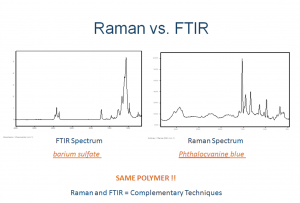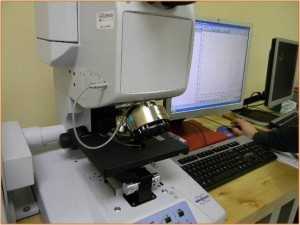Raman spectroscopy is an inelastic scattering phenomenon the probes molecular vibrations to provide a molecular fingerprint of materials. Currently, there are six major types of Raman spectroscopy in use today, which are: Spontaneous Raman Spectroscopy, Resonance Raman spectroscopy (RRS), Surface Enhanced Raman spectroscopy (SERS), Coherent Anti-Stokes Raman Scattering (CARS), Stimulated Raman Spectroscopy (SRS) and Spatially Offset Raman Spectroscopy (SORS).
Comparison of Raman and FTIR Spectroscopy: Advantages and Limitations
[fa icon="calendar'] Oct 9, 2013 9:55:10 AM / by David Exline posted in Blog, Featured Articles, Fourier transform infrared spectroscopy, FTIR spectroscopy, Raman spectroscopy
Featured Application: Micro-FTIR Spectroscopy
[fa icon="calendar'] Jul 22, 2013 9:00:17 AM / by Rebekah Byrne posted in Blog, chemical identification, Fourier transform infrared spectroscopy, Materials Science, Micro-FTIR, Optical Microscopy, Raman, sem-eds
Fourier transform infrared spectroscopy, or FTIR, is a vibrational spectroscopy method which is based upon the measurement of specific frequencies which occur between chemical bonds in a given material. Interestingly, as materials may be unique in chemical nature, so are the infrared spectra which they yield, resulting in a unique “fingerprint” for a given material. As such, this makes FTIR a very resourceful tool for such things as:


